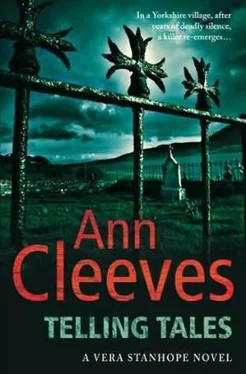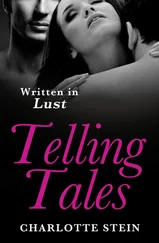Ann Cleeves - Telling Tales
Здесь есть возможность читать онлайн «Ann Cleeves - Telling Tales» весь текст электронной книги совершенно бесплатно (целиком полную версию без сокращений). В некоторых случаях можно слушать аудио, скачать через торрент в формате fb2 и присутствует краткое содержание. Жанр: Детектив, на английском языке. Описание произведения, (предисловие) а так же отзывы посетителей доступны на портале библиотеки ЛибКат.
- Название:Telling Tales
- Автор:
- Жанр:
- Год:неизвестен
- ISBN:нет данных
- Рейтинг книги:5 / 5. Голосов: 1
-
Избранное:Добавить в избранное
- Отзывы:
-
Ваша оценка:
- 100
- 1
- 2
- 3
- 4
- 5
Telling Tales: краткое содержание, описание и аннотация
Предлагаем к чтению аннотацию, описание, краткое содержание или предисловие (зависит от того, что написал сам автор книги «Telling Tales»). Если вы не нашли необходимую информацию о книге — напишите в комментариях, мы постараемся отыскать её.
Telling Tales — читать онлайн бесплатно полную книгу (весь текст) целиком
Ниже представлен текст книги, разбитый по страницам. Система сохранения места последней прочитанной страницы, позволяет с удобством читать онлайн бесплатно книгу «Telling Tales», без необходимости каждый раз заново искать на чём Вы остановились. Поставьте закладку, и сможете в любой момент перейти на страницу, на которой закончили чтение.
Интервал:
Закладка:
In contrast, Robert had bounced around the place, wearing them out. And now it was Saturday and although their belongings were still in boxes and Mary looked exhausted, he insisted that they take a trip out to explore their new surroundings. Perhaps they were carried along by his enthusiasm or perhaps they didn’t have the energy to put up a fight, but it was agreed very quickly without argument. A bike ride, he said. Obvious. Ideal because the country’s so flat. And he climbed over the packing cases in the garage to pull out their bikes.
They rode in line with Robert at the front. He was dressed in big khaki shorts which flapped at the leg and a T-shirt with the Christian symbol of the fish on the front. Emma enjoyed the sensation of riding, the pull on her legs, the smell of salt and seaweed and mud. But all the time she was thinking, Please don’t let anyone from my new school see me. Not with my parents and my nerdy brother, all of us looking like something out of Enid Blyton.
Then they were at the Point, and that must have been where Robert was aiming for all the time though he never said. And suddenly it was like riding over the sea, with water on both sides and gulls flying alongside them. At the ice-cream van they stopped. They flopped onto the grass, with the bikes on their sides next to them, while Robert went to buy the ice creams. Christopher rolled onto his stomach and trapped a ladybird under his cupped hands. He’d always captured insects that way. He was looking at it through a hole he’d formed between his thumbs and first fingers, then there was the roar of an engine. He sat up to look and the ladybird flew away.
Arriving back with the ice creams, Robert glowered at the noise. His perfect family afternoon had been disturbed. He muttered about hooligans. The car was black and shiny, a convertible with the roof down, and it pulled up beside them. Loud music, which Emma failed to recognize, continued even after the engine had been turned off. In the passenger seat was Abigail Mantel, her red hair in effective disarray. At first, Emma thought the car must belong to a boyfriend. Abigail seemed much older than she was. Even at that first glimpse you could tell she was the sort of girl who would attract a boyfriend with a powerful car.
Abigail slid out of her seat. She was wearing a denim skirt with a slit down the side and a tight red vest top. They presumed she intended to buy ice cream and made a point of not staring, though Christopher didn’t manage too well. Emma was surprised. She’d never seen him take any notice of girls before. But to everyone’s astonishment Abigail approached them. The ice cream dripped down soggy cones. She lowered herself onto the grass beside Emma. Christopher’s mouth was slightly open, but he was too far away for Emma to kick him.
“Hi,” Abigail said. Her voice was slightly drawling, but not unfriendly. “Aren’t you the new girl? I’ve seen you on the bus. I thought it was you. I asked dad to stop.”
Emma hated the school bus. It was crowded and noisy and no one had made an effort to be friendly.
Each morning she made sure she sat in a corner and stared out of the window. Certainly she had never noticed Abigail.
“Yes,” she said. “Of course. Hi.”
Had Keith got out of the car to join them too? Although she strained to think, Emma couldn’t form a picture of him sitting on the grass beside them. She couldn’t hear his voice in her head. Robert certainly had spoken to Abigail. There’d been quite a conversation and he’d been impressed by her politeness. He’d asked her name, then introduced the family. They’d discussed where she lived and the subjects she was taking at school. When at last she’d returned to the car with a wave, he’d said, “She seems a pleasant girl, Em. There, I said it would be easy to make friends in the country.”
Mary hadn’t said a word. She’d seemed frozen. It had been as if she were holding her breath. Perhaps she’d been less certain than Robert that they’d be readily accepted by the natives.
It occurred then to Emma that the meeting with Abigail on the Point must have slipped from Robert’s mind too. He’d told his manager that it would be appropriate for him to supervise Jeanie Long because there was no conflict of interest. He hadn’t known Abigail Mantel, hadn’t even met her. Emma supposed that such a fleeting conversation would hardly count as a meeting.
Wendy, always immaculately turned out for work, always precise and meticulous in anything concerning the launch, lived in domestic chaos. Emma loved the disarray in the whitewashed cottage. Perhaps that was the basis for her affection for the coxswain. They had little else in common. In this house of overflowing waste bins and mountainous laundry baskets she felt liberated, and at the same time superior. She envied Wendy’s confidence. How sure of herself she must be! 1b allow people into a kitchen with unwashed dishes, the foil containers from last night’s take away piled on the table, knickers, still slightly stained despite having been through the wash, draped on a radiator. But despite the envy Emma felt she was a better person because her house was more ordered. She was proud of the clean windows, the boiled dish cloths, the washed curtains.
“I’m really not sure how Wendy would cope with a baby,” she’d once said to James, knowing as she spoke how smug she must sound.
Today Wendy had finished her twelve-hour shift at midday, but Emma had known she’d still be about. She seemed not to need sleep. Cigarettes and caffeine kept her going, she said, and today there was a cigarette drooping from the corner of her mouth, as she used both hands to rewire the plug of an iron. She always kept busy despite the mess. When Emma brought in the baby she stubbed out the cigarette and opened a window, but the smell of smoke lingered, hiding something more unpleasant which Emma couldn’t quite identify. Rotting vegetables perhaps, or sour milk. It appeared to come from the larder. Wendy seemed not to notice. She moved her bag of tools from a kitchen chair so Emma could sit down.
“Did you hear the news about Michael’s daughter?”
Her first words, with her back to Emma, as she poured boiling water over instant coffee. Then she turned to judge Emma’s reaction, to share the shock. Throughout the village, Emma thought, people are talking like this. Enjoying the excitement. Feeling that geography has given them an unexpected role in the drama.
“Yes,” Emma said. “I saw it on the television.” Then, offering up the information as a gift, as you might bring chocolates and wine to a dinner party, “Michael was in church yesterday.”
“Was he? I can’t say I liked the old bugger, but you can’t help feeling sorry…”
“He walked out,” Emma said. “I suppose he didn’t want to face people after.” She couldn’t bring herself to mention the scene he’d made, spitting wine at her father.
“You realize what this means, don’t you?” Wendy leaned forward. She’d changed from her uniform into jeans and a big, hand-knitted sweater. Her eyes were bright with exhaustion and something else, which made Emma wonder about her, wonder what was really going on in her head. What was it? Desperation?
Exhilaration? Wendy wasn’t always alone. There’d been men friends, lovers. Occasionally they’d moved in, but they’d never stayed long. Wendy had made out she didn’t mind, and at the time Emma had been taken in.
“What does it mean?” she asked gently.
“That the murderer’s still out there, of course,”
Wendy said. “And I can’t see that it could have been a stranger. The police must have asked, ten years ago,
if anyone had seen a stranger around. It would have been noticed, wouldn’t it? A Sunday afternoon in
Читать дальшеИнтервал:
Закладка:
Похожие книги на «Telling Tales»
Представляем Вашему вниманию похожие книги на «Telling Tales» списком для выбора. Мы отобрали схожую по названию и смыслу литературу в надежде предоставить читателям больше вариантов отыскать новые, интересные, ещё непрочитанные произведения.
Обсуждение, отзывы о книге «Telling Tales» и просто собственные мнения читателей. Оставьте ваши комментарии, напишите, что Вы думаете о произведении, его смысле или главных героях. Укажите что конкретно понравилось, а что нет, и почему Вы так считаете.












